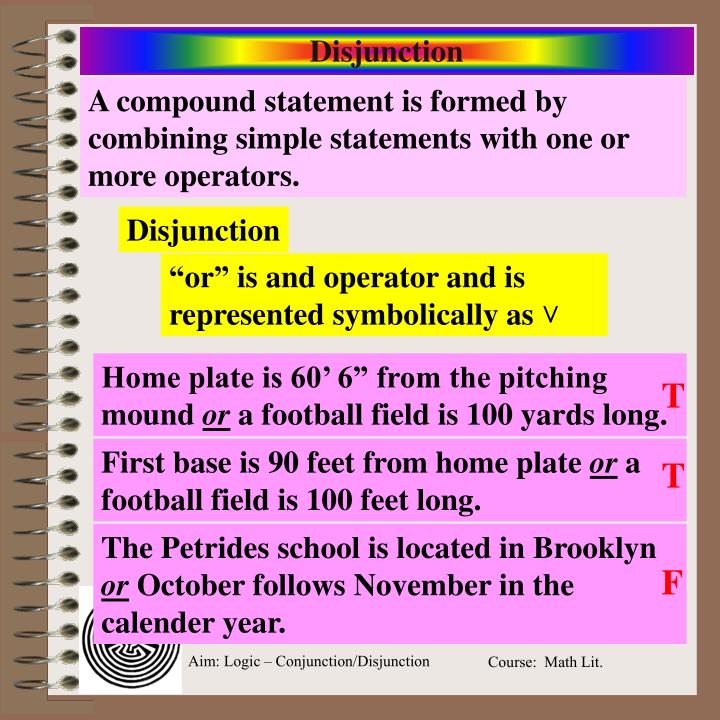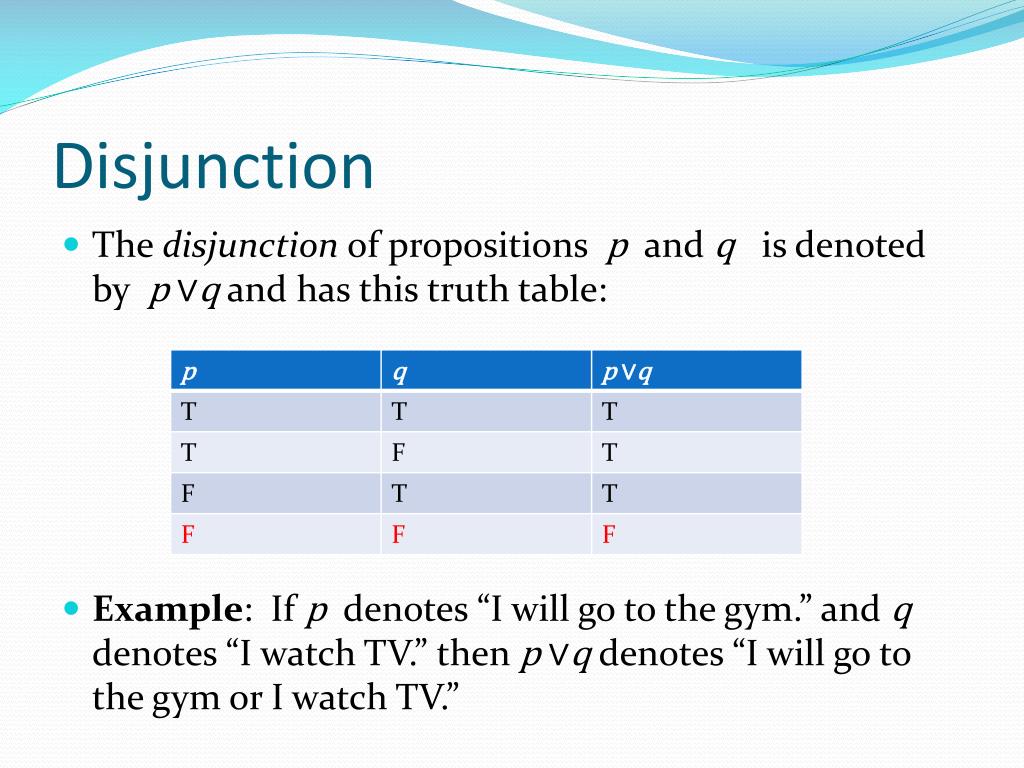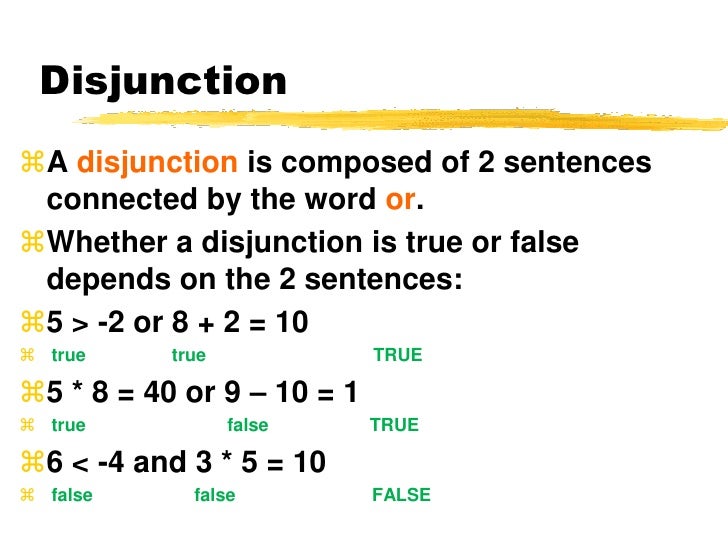Disjunction Math Definition
Disjunction Math Definition - Disjunction is an essential part of propositional logic, allowing mathematicians to express complex logical relationships and conditions. Disjunction is a logical connective that combines two statements with the word 'or,' resulting in a compound statement that is true if. In mathematics, a disjunction is a logical operation that connects two statements (propositions) and is true if at least one of the. A disjunction is a compound statement formed by joining two statements with the connector or. In mathematics, specifically in logic, a disjunction refers to a logical statement that combines two or more conditions using the word “or.” it is denoted. It is false only when both \(p\) and \(q\) are false. The disjunction “p or q” is symbolized by p q. The disjunction “\(p\) or \(q\)” is denoted “\(p\vee q\)”.
In mathematics, a disjunction is a logical operation that connects two statements (propositions) and is true if at least one of the. The disjunction “\(p\) or \(q\)” is denoted “\(p\vee q\)”. It is false only when both \(p\) and \(q\) are false. Disjunction is an essential part of propositional logic, allowing mathematicians to express complex logical relationships and conditions. In mathematics, specifically in logic, a disjunction refers to a logical statement that combines two or more conditions using the word “or.” it is denoted. The disjunction “p or q” is symbolized by p q. A disjunction is a compound statement formed by joining two statements with the connector or. Disjunction is a logical connective that combines two statements with the word 'or,' resulting in a compound statement that is true if.
In mathematics, specifically in logic, a disjunction refers to a logical statement that combines two or more conditions using the word “or.” it is denoted. It is false only when both \(p\) and \(q\) are false. A disjunction is a compound statement formed by joining two statements with the connector or. The disjunction “p or q” is symbolized by p q. In mathematics, a disjunction is a logical operation that connects two statements (propositions) and is true if at least one of the. Disjunction is a logical connective that combines two statements with the word 'or,' resulting in a compound statement that is true if. The disjunction “\(p\) or \(q\)” is denoted “\(p\vee q\)”. Disjunction is an essential part of propositional logic, allowing mathematicians to express complex logical relationships and conditions.
Logische Disjunktion Symbol für logische Konjunktion, Bereich, Pfeil
Disjunction is an essential part of propositional logic, allowing mathematicians to express complex logical relationships and conditions. In mathematics, specifically in logic, a disjunction refers to a logical statement that combines two or more conditions using the word “or.” it is denoted. Disjunction is a logical connective that combines two statements with the word 'or,' resulting in a compound statement.
Discrete Mathematics Disjunction Introduction Disjunction Logic
A disjunction is a compound statement formed by joining two statements with the connector or. In mathematics, a disjunction is a logical operation that connects two statements (propositions) and is true if at least one of the. Disjunction is an essential part of propositional logic, allowing mathematicians to express complex logical relationships and conditions. Disjunction is a logical connective that.
PPT Aim What is the conjunction and disjunction of the truth
Disjunction is an essential part of propositional logic, allowing mathematicians to express complex logical relationships and conditions. The disjunction “\(p\) or \(q\)” is denoted “\(p\vee q\)”. It is false only when both \(p\) and \(q\) are false. The disjunction “p or q” is symbolized by p q. Disjunction is a logical connective that combines two statements with the word 'or,'.
Algebra 1 4.5 Disjunctions YouTube
Disjunction is a logical connective that combines two statements with the word 'or,' resulting in a compound statement that is true if. It is false only when both \(p\) and \(q\) are false. A disjunction is a compound statement formed by joining two statements with the connector or. The disjunction “\(p\) or \(q\)” is denoted “\(p\vee q\)”. The disjunction “p.
Math Conjunction Examples
Disjunction is an essential part of propositional logic, allowing mathematicians to express complex logical relationships and conditions. In mathematics, specifically in logic, a disjunction refers to a logical statement that combines two or more conditions using the word “or.” it is denoted. It is false only when both \(p\) and \(q\) are false. A disjunction is a compound statement formed.
Propostional Logic 3 Conjunction and Disjunction YouTube
Disjunction is a logical connective that combines two statements with the word 'or,' resulting in a compound statement that is true if. The disjunction “\(p\) or \(q\)” is denoted “\(p\vee q\)”. The disjunction “p or q” is symbolized by p q. In mathematics, specifically in logic, a disjunction refers to a logical statement that combines two or more conditions using.
Conjunction Disjunction and Negation Statements An easy introduction
A disjunction is a compound statement formed by joining two statements with the connector or. It is false only when both \(p\) and \(q\) are false. In mathematics, a disjunction is a logical operation that connects two statements (propositions) and is true if at least one of the. The disjunction “\(p\) or \(q\)” is denoted “\(p\vee q\)”. The disjunction “p.
What are the Truth Definitions for Disjunction? YouTube
It is false only when both \(p\) and \(q\) are false. The disjunction “\(p\) or \(q\)” is denoted “\(p\vee q\)”. Disjunction is a logical connective that combines two statements with the word 'or,' resulting in a compound statement that is true if. In mathematics, specifically in logic, a disjunction refers to a logical statement that combines two or more conditions.
What Is The Math Meaning Of Disjunction at James Boyd blog
Disjunction is an essential part of propositional logic, allowing mathematicians to express complex logical relationships and conditions. In mathematics, specifically in logic, a disjunction refers to a logical statement that combines two or more conditions using the word “or.” it is denoted. It is false only when both \(p\) and \(q\) are false. The disjunction “p or q” is symbolized.
Algebra 5 Point 3
It is false only when both \(p\) and \(q\) are false. In mathematics, a disjunction is a logical operation that connects two statements (propositions) and is true if at least one of the. In mathematics, specifically in logic, a disjunction refers to a logical statement that combines two or more conditions using the word “or.” it is denoted. The disjunction.
A Disjunction Is A Compound Statement Formed By Joining Two Statements With The Connector Or.
Disjunction is an essential part of propositional logic, allowing mathematicians to express complex logical relationships and conditions. The disjunction “p or q” is symbolized by p q. The disjunction “\(p\) or \(q\)” is denoted “\(p\vee q\)”. It is false only when both \(p\) and \(q\) are false.
In Mathematics, A Disjunction Is A Logical Operation That Connects Two Statements (Propositions) And Is True If At Least One Of The.
In mathematics, specifically in logic, a disjunction refers to a logical statement that combines two or more conditions using the word “or.” it is denoted. Disjunction is a logical connective that combines two statements with the word 'or,' resulting in a compound statement that is true if.









